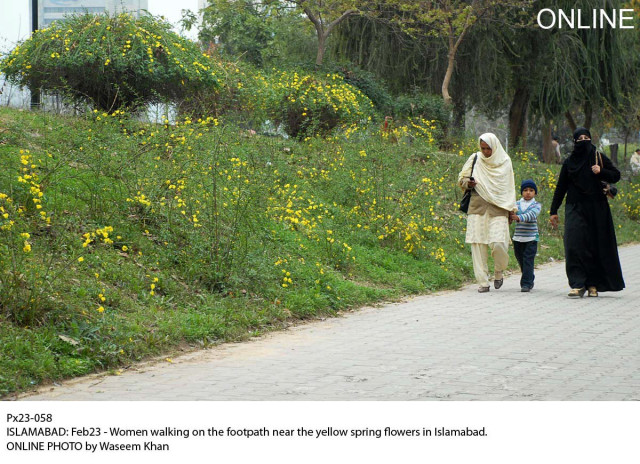Spring woes: Patients scramble to hospitals amid record pollen count
Doctors suggest allergy, asthma patients avoid going out during the day, use masks

Doctors suggest allergy, asthma patients avoid going out during the day, use masks. PHOTO: ONLINE
As a result, the number of allergy and asthma patients heading to the capital’s hospitals seeking treatment has skyrocketed.
On an average, around 1,000 to 1,200 patients have shown up at the outpatient departments (OPDs) of the Federal Government Services Hospital, Polyclinic.
According to the hospital’s media coordinator Dr Sharif Astori, apart from patients from the city, they also receive a large number of patients from outside the capital who have a history of allergy problems and complain of breathing issues when they enter the city.
Dr Astori added that they had made special arrangements at the hospital to cater to allergy patients in the season.
Dr Waseem Khawaja at the Pakistan Institute of Medical Sciences (Pims) said that so far they had treated over 3,000 patients for allergy-related complaints in the OPDs of the hospital. He added that they were receiving between 200 to 250 asthma patients every day for emergency nebulization.
Dr Hasan Orooj, director general of health at the Capital Development Authority, said the directorate had converted 11 of its dispensaries in various rural and urban areas into allergy camps to facilitate patients.
The authority is expected to expand the number of camps by setting one up at the Abpara community centre soon. Dr Orooj said patients having a history of allergies should take preventive medicines and other precautions before the start of the season.
He advised patients to keep their rooms hermetically sealed and their carpets free because pollen grains get enmeshed in carpets. They should also avoid going outside from 11am to 1pm and 4pm to 7pm, times when the pollen count is high. If going outdoors is necessary, he advised they should wear wet masks.
After some light rain last week, pollen concentration in capital jumped exponentially going from 9,012 grains per cubic metres of air (m3) last Friday to over 39,857 m3 on Saturday, the Pakistan Meteorological Department said. This was the highest pollen count for Islamabad since 2012 when the highest pollen count was recorded at 36,164 m3. By contrast, the highest pollen count recorded in recent years was 48,080 m3 in 2005.
According to officials at the Pakistan Meterological Department (PMD), the pollen count is expected to rise further in the coming days as the dry weather persists.
The pollen season in the twin cities of Islamabad and Rawalpindi starts in March, coinciding with the spring, and usually lasts until May.
The most abundant types of pollen in Islamabad are from the eight different types of trees and vegetation including Paper Mulberry, Acacia, Eucalyptus, Pines, grass, Cannabis, Dandelion and Alternaria.
Of these, Paper Mulberry contributes to around 97 per cent of the total pollen density in Islamabad. At the peak of the spring, its concentration can rise to extreme limits of around 40,000 per cubic meter of air. Of the 39,857 m3 of pollen recorded on Saturday, 39,815 m3 were of Paper Mulberry.
According to the meteorological department, the highest concentration of Paper Mulberry pollen was recorded in the Sector H-8 area. By comparison, its concentration recorded in Sectors E-8, F-10 and G-6 is relatively lower at around the 10,000-15,000 mark.
People suffering from asthma and other respiratory diseases can experience serious consequences due to a sharp increase in pollen concentrations. Weather can also influence allergy symptoms.
Published in The Express Tribune, March 26th, 2017.



















COMMENTS
Comments are moderated and generally will be posted if they are on-topic and not abusive.
For more information, please see our Comments FAQ